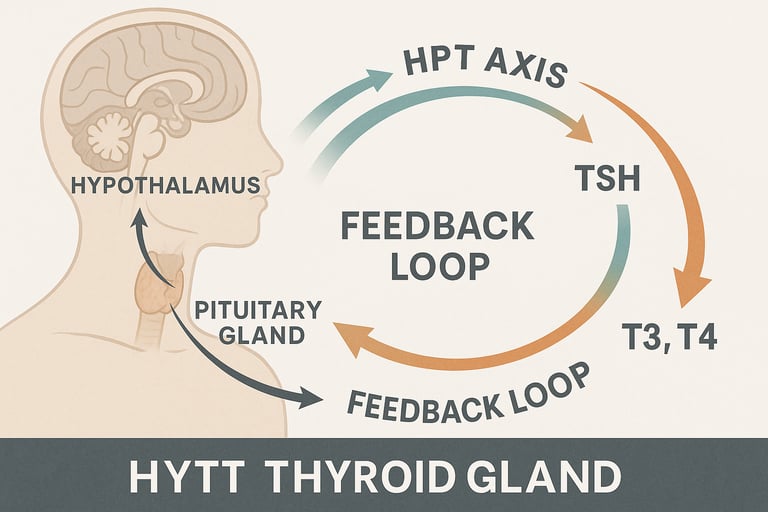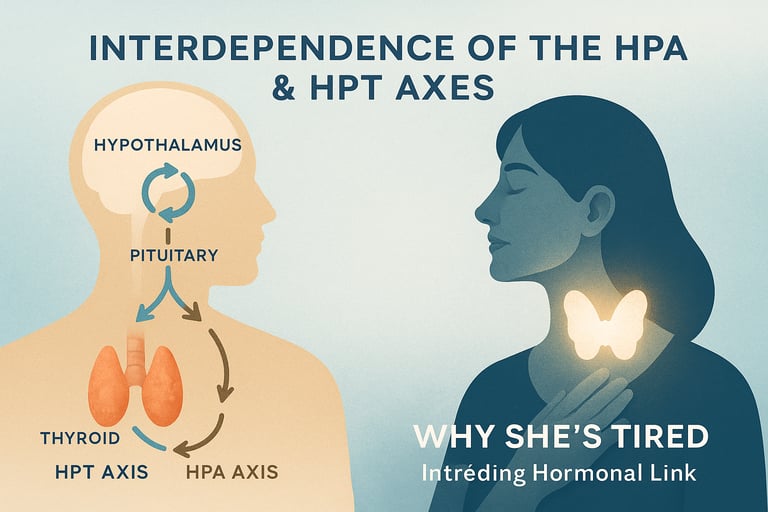Beyond PMS Is Your Thyroid Secretly Fueling Women's Mood Swings & Stress?
Are your mood swings and stress more than just PMS? Discover the critical thyroid's role in women's emotional health and how imbalance impacts your well being. Get insights & actionable steps!
9/30/202510 min read


Beyond PMS Unmasking Your Thyroid's Influence on Mood & Stress
Every month, for countless women across the United States, a familiar narrative unfolds, irritability, sadness, anxiety, and a general feeling of being utterly overwhelmed. We’re quick to attribute these emotional hurricanes to Premenstrual Syndrome, or PMS, a convenient and often accurate explanation. But what if the story runs deeper? What if there's an unseen conductor behind the scenes, subtly pulling the strings of your emotional well being, often disguised as something else entirely? I’m talking about your thyroid gland, a small, butterfly shaped organ in your neck that wields immense power over virtually every system in your body, including your mood and your ability to handle stress. If you've ever felt you're about to embark on an emotional rollercoaster, unexplainable, it's time to discover the great thyroid's role in women's mood swings & stress.
This article will take a close look at the intricate interplay between your thyroid, your hormones, and your mood. We'll explore how an underactive thyroid and an overactive thyroid may be felt through anxious emotional symptoms, often more than not mimicking other illnesses. By the end, you'll be better informed to look beyond PMS and consider your thyroid, with information to act proactively towards reclaiming your emotional equilibrium.
In a Nutshell
The Thyroid's Domain: This small gland regulates metabolism, energy, and profoundly influences mood and stress reaction.
Beyond PMS: Most mood swings, anxiety, and blue feelings typically blamed on PMS or everyday stress are actually thyroid related.
Hypo vs Hyper: Both an underactive (hypothyroidism) and overactive (hyperthyroidism) thyroid can lead to emotional turmoil, with varying but sometimes overlapping symptoms.
Holistic Treatment: Treatment of mood and stress related to thyroid needs medical diagnosis, lifestyle modification, and specialist nutrient support.
The Unseen Conductor Your Thyroid and the Symphony of Your Inner Life
Imagine there is an orchestra and one small instrument is out of tune. The entire concert is disturbed, isn't it? That's precisely what your thyroid does in your body. This endocrine gland produces hormones primarily thyroxine (T4) and triiodothyronine (T3) that regulate your metabolism, energy production, temperature regulation, and even your heartbeat. If your hormones become imbalanced, the domino effect is experienced by your entire system, including your nervous and brain system, and it triggers extreme swings in thyroid and mood.
The Symphony of Hormones T3, T4, and TSH
Your T3 and T4 thyroid hormones are essentially your body's gas pedals. They tell your cells how to take nutrients and convert them into energy at what rate. Your pituitary gland's secreted hormone, TSH, regulates their production. TSH can be thought of as the director who tells your thyroid to produce more or less of these T3 and T4 hormones. Having a healthy ratio of these hormones is crucial to maintaining even emotional regulation. When this delicate balance is upset, your emotional health suffers.
When the Rhythm Falters Hypothyroidism's Emotional Shadow
Underactive thyroid, or hypothyroidism, occurs when your thyroid gland does not produce enough hormones. It's a remarkably common condition, with an estimated 4.6% of people over 12 years of age in the U.S. having it, and women being 5 to 8 times as likely as men to develop underactive thyroid. When your metabolism slows down, so can your mental processes, and a constellation of emotional symptoms are confused with depression or chronic fatigue.
"For the majority of women, the subtle onset of hypothyroidism will seem as if they are slowly losing their dynamic self, appearing first as unexplained sadness or sluggishness," explains physician . "Thyroid function needs to be considered when evaluating persistent mood disturbances, especially when typical antidepressants are only partially effective."
Common emotional and mental symptoms of hypothyroidism include
Depression: Generalized sadness, loss of interest, and hopelessness.
Fatigue and Lethargy: Continuing fatigue even with adequate sleep.
Brain Fog: Difficulty concentrating, memory loss, and slowed-down thinking.
Irritability: Shorter fuse and increased frustration.
Anxiety: Less common than depression, but some hypothyroid women report generalized anxiety.
This slowing of brain activity will make everything feel like climbing a hill, which explains the extreme hypothyroidism mood swings so characteristic of women. It's not fatigue; it's feeling heavy-headed and heavy bodied.
The Overdrive Effect Hyperthyroidism's Anxious Grip
On the other hand, hyperthyroidism, an overactive thyroid, is when your gland produces too much hormone. This accelerates your body's activities, often overloading your nervous system. While less common than hypothyroidism, it can be equally disturbing to emotional balance. Graves' disease, a disease in which the body's immune system attacks and overstimulates the thyroid gland, is the most common cause of hyperthyroidism.
Picture your internal motor racing all the time. That's how it is for individuals with hyperthyroidism. This incessant level of hyperarousal can mimic anxiety disorders, panic attacks, and even mania.
Symptoms may include:
Anxiety and Nervousness: Ongoing sensations of uneasiness, restlessness, and fear.
Irritability: Increased sensitivity and short temper.
Panic Attacks: Sudden intense attacks of fear with physical symptoms such as rapid heartbeat.
Difficulty Concentrating: One still has difficulty concentrating even in the state of increased arousal.
Emotional Lability: Moods shift rapidly, shifting quickly from euphoria to depression.
It's easy to see how this constant state of restlessness could be confused with a primary anxiety disorder. Understanding the association between hyperthyroidism anxiety is an essential starting point in receiving appropriate treatment.
More Than Just Hormones The Thyroid Adrenal Stress Connection
The thyroid is not doing it by itself. It's part of an intricate web, the endocrine system, that includes the adrenal glands and the sex organs. With all this complicated interaction comes the fact that physical and emotional stress can actually disrupt thyroid function, and the other way around. It's a two way street that traps women often in a vicious cycle of exhaustion, mood swings, and burnout.
Cortisol's Complicity Stress, Thyroid, and Mood
Under stress, your adrenal glands release cortisol, also known as the "stress hormone." A crucial part of fight or flight reactions, high cortisol on a chronic level can be devastating. Excessive cortisol can inhibit production of TSH, decelerate the conversion of inactive T4 to active T3, and even result in autoimmune thyroid diseases like Hashimoto's thyroiditis. It is a vicious cycle: stress impacts thyroid function, and thyroid function makes you feel more stressed.
This connection underscores the importance of comprehending the thyroid stress connection. It is not just about managing your thyroid; it's about managing your general stress response to serve your thyroid.
The Gut Brain Thyroid Axis An Unsung Hero
Besides hormones and stress, recent studies indicate that both the gut microbiome depend on emotional state and thyroid function. The gut plays an essential role in nutrient uptake, immune response, and even the conversion of T4 to T3. An imbalanced gut, also known as dysbiosis, can cause inflammation, which then can decrease thyroid function and aggravate mood disorders.
Consider the following example, many of the serotonin molecules that are crucial for mood in your body are produced in your gut. Thus, a compromised gut can impact thyroid hormone supply as well as neurotransmitter equilibrium, more than doubling the impact on your mood and stress.
Exploring the Maze Thyroid Symptoms and PMS
So how do you differentiate normal PMS from something more severe like a thyroid imbalance? It's a question many women wrestle with, partly because the symptoms do overlap. The difference boils down to patterns, severity, and frequency of other non emotional symptoms.
When to Suspect Your Thyroid Key Indicators
While PMS symptoms usually occur in the week or two leading up to your period and disappear as soon as it begins, thyroid related mood swings and stress tend to linger throughout the month, sometimes increasing at certain times, but hardly ever completely vanishing. Check for these other clues:
For Hypothyroidism
Chronic tiredness with no relation to sleep.
Weight gain that cannot be explained or losing weight without trying.
Constant feeling of cold, even in warm weather.
Dry, brittle hair, nails, hair loss
.
Constipation.
Irregular periods (heavy or more frequent).
For Hyperthyroidism
Excessive weight loss despite increased appetite.
Heat intolerance, sweating.
Increased or racing heart (palpitations).
Hand shaking.
Muscle weakness.
Changes in menstrual cycle (less frequent or lighter periods)
.
Insomnia.
If you are experiencing some combination of these physical and emotional symptoms that last beyond your menstrual cycle, or if your emotional symptoms are debilitating and overwhelming, it's a very good clue to explore further.
The Diagnostic Journey What to Expect
If you suspect your thyroid is involved, your first action is to consult your healthcare provider. He or she will likely send you a battery of blood tests to determine your thyroid hormone level. The most critical tests typically are:
TSH (Thyroid-Stimulating Hormone): Your first test likely will be this one. High TSH indicates an underactive thyroid (hypothyroidism), and low TSH suggests overactive thyroid (hyperthyroidism).
Free T4 (Free Thyroxine): This measures the active, free form of T4 in your blood.
Free T3 (Free Triiodothyronine): This tests the active, free form of T3.
Thyroid Antibody Tests (e.g., TPOAb, TgAb): These can identify autoimmune diseases like Hashimoto's (most common cause of hypothyroidism) or Graves' disease (most common cause of hyperthyroidism).
Don't hesitate to demand thorough testing. Sometimes they only test TSH, which could overlook mild imbalances or developing problems. A complete panel gives a better indication of your thyroid function and aids your doctor in pinpointing the underlying source of your symptoms.
Your Action Plan Reclaiming Emotional Balance
Learning about an imbalance in your thyroid can be frightening, but empowering. It provides you with a tangible explanation for why you've been feeling the way you have and a clear path forward. Returning on emotional footing when your thyroid is the cause requires a multi dimensioned approach.
Working With Your Doctor
Diagnosis and Treatment: Proper diagnosis is most crucial. If you have hypothyroidism, your doctor will likely place you on synthetic thyroid hormone (levothyroxine) to achieve normal levels. Hyperthyroidism treatment includes anti thyroid medications, radioactive iodine therapy, or surgery.
Regular Monitoring: Once put on medication, frequent check-ups of your thyroid hormone levels are critical in order to have your dosage perfectly adjusted and manage symptoms.
Open Communication: Tell all your symptoms, emotional and physical, to your doctor in an open manner. Your mood is a good indicator of how well your thyroid medicine is working for you.
Lifestyle Changes That Count
Medicine is always necessary, but lifestyle choices deeply affect assisting your thyroid and your health. These are not "nice to haves"; they're must haves.
Stress Management: Due to the thyroid stress relationship, minimizing stress is a top priority. Include activities such as meditation, yoga, deep breathing, time outdoors, or activities that bring you joy. Even 15-20 minutes of daily focus can be beneficial.
Quality Sleep: Get 7-9 hours of healing sleep each night. Lack of sleep can put hormone balance out of whack, including thyroid hormone balance, and enhance mood swings.
Regular Exercise: Regular moderate exercise like walking, swimming, or cycling improves mood, reduces stress, and optimizes metabolic health. Avoid over exercising that sometimes over stresses the body.
Restrict Processed Foods: A diet of whole foods without processed foods can suppress inflammation, which benefits thyroid well being, especially in autoimmune conditions.
Nutritional Support and Supplementation
While a well balanced diet is key, there are certain nutrients that play a special role in thyroid function and can be considered under the guidance of your doctor.
Iodine: Required for the production of thyroid hormones, but excessive can be harmful, especially in autoimmune thyroid disease. Sources include seaweed, fish, and iodized salt. Don't supplement without talking to your doctor.
Selenium: Crucial in the conversion of T4 to T3 and plays a role as an antioxidant, protecting the thyroid gland's health. Brazil nuts are a good source.
Zinc: Essential for the manufacture of important hormones TSH and conversion of thyroid. Meats, shellfish, legumes, seeds.
Vitamin D: Virtually all people with a thyroid disorder lack Vitamin D, which has functions in immune system and mood.
B Vitamins: Especially B12, are essential to energy production and nerve function, often deficient among individuals with hypothyroidism.
Remember that supplements are used to complement, not replace, medical therapy and are always with your health professional so as not to have interactions or side effects.
Our Number One Favorite for Thyroid Balance in Women
It is overwhelming trying to unravel the complexity of thyroid health and how it impacts your energy and mood levels. Most women are attracted to a caring, whole approach to help their journey to balance. If you're looking for all around care that calms the thyroid and yet nourishes the full spectrum of feminine health vibrant energy, stable mood, and wholesome flow we've found a better way. This precisely blended mix understands a woman's body requires something special, bringing vital nutrients and plant extracts that resonate with your very own biology, making you feel more grounded and alive.
We highly recommend you experience Thyrafemme Balance for yourself. It's designed to offer loving support for whole feminine wellness, driven by science and nature, with 14 of the most important ingredients chosen for optimal thyroid function and overall vitality.
Mindfull thought of sufferer
Can thyroid problems mimic other conditions like anxiety or depression? Absolutely. Both hypothyroidism and hyperthyroidism can present with symptoms that closely resemble anxiety disorders, clinical depression, or even bipolar disorder. This overlap often leads to misdiagnosis or delayed treatment, highlighting the importance of comprehensive thyroid testing when mental health symptoms are present.
Why are women more susceptible to thyroid issues? Women are significantly more prone to thyroid conditions, particularly autoimmune thyroid diseases like Hashimoto's and Graves' disease. The exact reasons are not fully understood, but hormonal fluctuations throughout a woman's life (menstruation, pregnancy, menopause) and genetic factors are believed to play a role in triggering or exacerbating these conditions.
How long does it take for mood to improve after starting thyroid treatment? The timeline for mood improvement varies greatly depending on the individual, the severity of the imbalance, and the type of treatment. For many, physical symptoms like fatigue might begin to improve within weeks, but emotional and cognitive improvements can take several months as hormone levels stabilize and the body adjusts. Consistent monitoring and patience are key.
A Path to Inner Peace Welcoming Thyroid Well being
Women have been conditioned for far too long to assume mood swings and chronic stress were simply part of the female package deal, dismissing their extreme emotional distress as "just PMS" or "being hormonal." But your body is an excellent communicator, and chronic mood swings, anxiety, and unexplained fatigue are not mere nuisances; they are frequently messengers. By acknowledging the role of the thyroid in women's stress & mood swings, you have an incredible tool through which to view these messages. It's an invitation to listen, to investigate, and to advocate for your health. The jump to discover and heal thyroid dysfunction is a life changing experience, not only generating better physical health, but also resulting in profound peace, additional energy, and better emotional balance. Your health is an investment that is worth investigating.And most important Women Good Health is Health of whole FAIMLY.
References
American Thyroid Association. "General Information About Thyroid Disease."
American Thyroid Association. "Thyroid Disease Statistics."
Brewer, Sarah. "The Complete Guide to the Thyroid." Hammersmith Books, 2021. - Published in 2021
National Institute of Diabetes and Digestive and Kidney Diseases (NIDDK). "Hypothyroidism (Underactive Thyroid)." - Published in 2023
National Institute of Diabetes and Digestive and Kidney Diseases (NIDDK). "Hyperthyroidism (Overactive Thyroid)." - Published in 2023




Health and Wellness
Your trusted source for health and fitness.
Connect
contact: beahealth.it@gmail.com
© 2025. All rights reserved.
